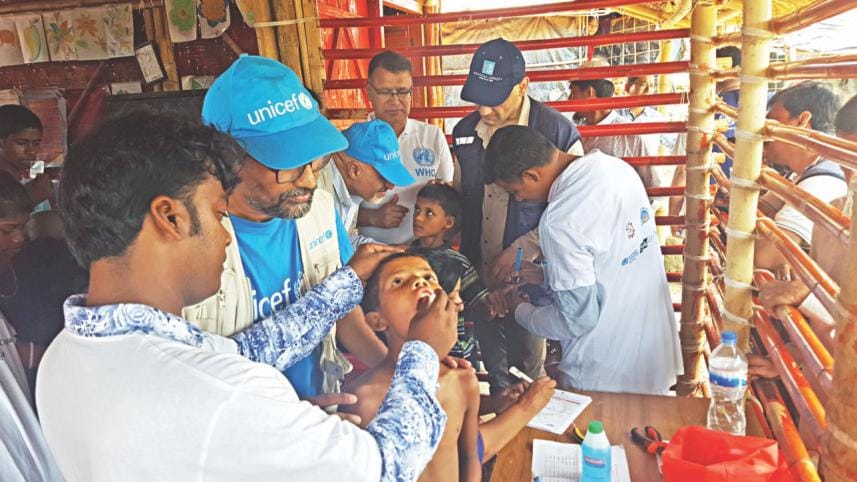Cholera Vaccination in Rohingya Camps: WHO begins week-long second phase

A massive cholera vaccination campaign began yesterday to protect nearly one million Rohingyas and host communities in Cox's Bazar to prevent any potential outbreak during the monsoon.
This is a second cholera vaccination campaign being held for the Rohingya refugees and host communities. Earlier 900,000 doses of oral cholera vaccine were administered to the vulnerable population in two phases in October-November last year, says a press release of World Health Organisation.
“Considering the water and sanitation conditions in the overcrowded camps and the increased risk of disease outbreaks in the monsoon season, the health sector is taking all possible measures to prevent cholera and other water and vector borne diseases,” says Dr Bardan Jung Rana, WHO representative in Bangladesh.
As many as 245 mobile vaccination teams have been deployed to vaccinate all people over the age of one year in refugee camps and host communities in Ukhia and Teknaf during nearly week-long campaign.
The health and family welfare ministry is leading the effort with support of WHO, Unicef, icddr,b and other partners.
“We have managed to prevent the cholera outbreak since the first campaign in October last year, but flood water, heavy storms and landslides in the monsoon season could damage water and sanitation facilities in the camps, increasing the risk again of an outbreak of this dangerous disease,” says Edouard Beigbeder, Unicef representative in Bangladesh.
“We have to take all initiatives to address the risk, including preventive measures through vaccination.”
The oral cholera vaccines have been made available through the Inter-Agency Coordinating Group with members from WHO, Unicef, Médecins Sans Frontières and International Federation of the Red Cross, the release says.
The vaccines and supplies are financed by Gavi, the vaccine alliance, it adds.
“This vaccination campaign is a part of the ongoing efforts of the government and the health sector partners to protect nearly a million people, including at least 1,35,000 Bangladeshis, who have been affected by the influx since last year,” says Abul Kalam Azad, director general of directorate general of health services under the health ministry.
In addition to vaccination, consistent efforts are being made to improve access to clean water and sanitation and promote hygiene. Unicef has been scaling up interventions and communication on safe practices.
WHO has raised an early warning, alert and response emergency surveillance system. It is also monitoring water quality and working with the Department of Public Health Engineering to enhance local laboratory capacity.
Both WHO and Unicef have prepositioned life-saving supplies to ensure rapid response to any outbreak.
The WHO-led health sector is supporting setting up of diarrhoea treatment centres, including five supported by Unicef and managed by icddr,b.
 For all latest news, follow The Daily Star's Google News channel.
For all latest news, follow The Daily Star's Google News channel.
Comments